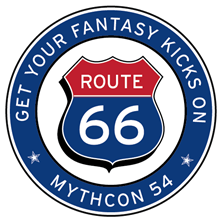Loading...
Document Type
Paper
Event Website
http://www.mythsoc.org/mythcon/mythcon-51.htm
Start Date
31-7-2021 12:00 PM
End Date
31-7-2021 12:45 PM
Description
Names are, in one sense, the outward indication of a power negotiation. The namer, the one who bestows a new name or uses an already-given name, reveals, through the choice of name they give or use, their relationship to that which they name. The act may indicate a more or less equal relationship; it may be an attempt to exert power over someone or something by imposing a name on it or by using a name that will influence those who hear it; or it may be a signal of submission and subordination, using a name to flatter or placate someone or something more powerful. In Genesis 2, naming is the first officially delegated sub-creational task, for God does not name the animals, but brings them before Adam to see what he will call them. All humans have the power to name, to rename, to take a new name, to give a nickname, to deny a name, to deadname . . . and Good Omens, book and show alike, is rife with significant acts of naming by both humans and other powers, from Crawley renaming himself Crowley to the constantly changing self-claimed sobriquets of the Four Other Horsemen. Adam Young, though, has this power in spades. Reality bends to his will, and his acts of naming *stick* and change what he names. While other name stories will be examined in this paper, the naming acts I will concentrate on will be the naming of Adam himself, Adam’s naming of the hell-hound as he comes into his power, and his climactic act (in the show) of naming Satan to be not his father, and thereby making it so.
Tech Mod: Alicia Fox-Lenz.
Creative Commons License

This work is licensed under a Creative Commons Attribution-NonCommercial-No Derivative Works 4.0 International License.
Included in
Adam’s Task: Naming and Subcreation in Good Omens
Names are, in one sense, the outward indication of a power negotiation. The namer, the one who bestows a new name or uses an already-given name, reveals, through the choice of name they give or use, their relationship to that which they name. The act may indicate a more or less equal relationship; it may be an attempt to exert power over someone or something by imposing a name on it or by using a name that will influence those who hear it; or it may be a signal of submission and subordination, using a name to flatter or placate someone or something more powerful. In Genesis 2, naming is the first officially delegated sub-creational task, for God does not name the animals, but brings them before Adam to see what he will call them. All humans have the power to name, to rename, to take a new name, to give a nickname, to deny a name, to deadname . . . and Good Omens, book and show alike, is rife with significant acts of naming by both humans and other powers, from Crawley renaming himself Crowley to the constantly changing self-claimed sobriquets of the Four Other Horsemen. Adam Young, though, has this power in spades. Reality bends to his will, and his acts of naming *stick* and change what he names. While other name stories will be examined in this paper, the naming acts I will concentrate on will be the naming of Adam himself, Adam’s naming of the hell-hound as he comes into his power, and his climactic act (in the show) of naming Satan to be not his father, and thereby making it so.
Tech Mod: Alicia Fox-Lenz.
https://dc.swosu.edu/mythcon/mc51/schedule/9



Comments
Recorded Session